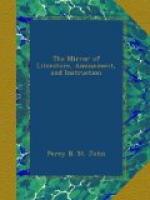Past my threescore and fifteenth year,
With spirits gay and conscience clear—
Joyous and frolicksome, though old,
And like this day, serene, but cold;
To foes well wishing, and to friends most kind,
In perfect charity with all mankind.
For what remains I must desire,
To use the words of Matthew Prior.
Let this my will be well obey’d,
And farewell all, I’m not afraid,
For what avails a struggling sigh.
When soon, or later, all must die?
M. DARLEY.”
Joshua West, who was known in his sphere “as
the poet of the Six Clerks’
Office,” made his will in rhyme; it is dated
13th December, 1804:
“Perhaps I die not worth a
groat,
But should I die worth somewhat
more,
Then I give that, and my best coat,
And all my manuscripts in
store,
To those who will the goodness have
To cause my poor remains to
rest,
Within a decent shell and grave,
This is the will of JOSHUA
WEST.”
In 1654, Henry Phillips published the “Purchasers’ Pattern,” in which he gives advice to purchasers of estates of inheritance, in verse.
There is also a long article in verse, “On the Distribution of Intestates’ Effects: it begins—
“By the laws of the land,
It is settled and planned,
That intestates’ effects shall be
spread,
At the end of the year,
When the debts are all clear,
’Mong the kindred as here may be
read.”
Before the conclusion, the author says,
“To the rest that succeed,
We need not proceed,
Enough has already been penn’d,
And now it’s high time,
For our doggrel rhyme
To come, lest it err, to an end.”
This hint I shall apply to myself, lest my article become as dry and uninteresting as my subject, and conclude with a declaration in which I heartily concur:
“Fee simple, and a simple
fee,
And all the fees in tail,
Are nothing when compared to thee,
Thou best of fees—female.”
W.A.R.
* * * * *
FINE ARTS
THE NINTH EXHIBITION OF THE SOCIETY OF BRITISH ARTISTS.
We are happy to learn that the “British Artists” continue to flourish. Their association, we believe, originated in the inefficiency of similar Institutions. They started in a spirit of generous rivalry, and, above all things, with the view to aid aspiring merit. It could, however, scarcely be called rivalry to any other Institution, and to this line of conduct we attribute much of the success of the Society of British Artists. As the Secretary states in an Address to the Public, prefixed to this year’s Catalogue, “they have never opposed, either directly or indirectly, any existing Institution for the promotion




